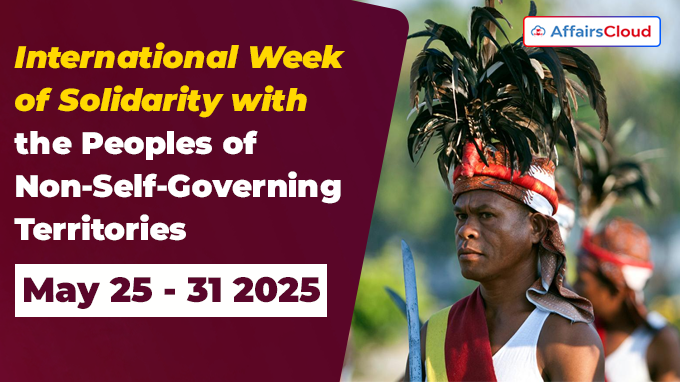 The United Nations (UN)’s International Week of Solidarity with the Peoples of Non-Self-Governing Territories is observed annually across the globe from 25 – 31 May to highlight the right of peoples in Non-Self-Governing Territories (NSGTs) to achieve self-determination and independence.
The United Nations (UN)’s International Week of Solidarity with the Peoples of Non-Self-Governing Territories is observed annually across the globe from 25 – 31 May to highlight the right of peoples in Non-Self-Governing Territories (NSGTs) to achieve self-determination and independence.
- The Week is a crucial reminder of the UN’s commitment to decolonization and the promotion of human rights, self-determination, and sustainable development for all peoples.
- The International Week of Solidarity with the People of Non-Self Governing Territories in 2025 is observed from May 25 (Sunday) to May 31 (Saturday).
Background:
i.The United Nations General Assembly (UNGA), through Resolution A/RES/54/91 “Implementation of the Declaration on the Granting of Independence to Colonial Countries and Peoples” adopted in December 1999, called for the annual observance of the Week of Solidarity with the Peoples of Non-Self-Governing Territories, starting from 25 May.
ii.The first International Week of Solidarity with the People of Non-Self Governing Territories was observed from 25 to 31 May 2000.
Non-Self-Governing Territories:
i.According to the Chapter XI of the UN Charter, a NSGTs is a territory “whose people have not yet attained a full measure of self-government.”
ii.In 1946, several UN member states identified specific territories under their administration as NSGTs and added them to a UN list.
- These countries, known as administering powers, were responsible for the territories. Due to the decolonization process over the years, most of these territories have been removed from the list.
iii.In 1946, eight UN Member States, Australia, Belgium, Denmark, France, the Netherlands, New Zealand, the United Kingdom (UK), and the United States of America (USA) identified 72 such territories under their administration.
- 8 territories gained independence before 1959. Communication from the administering powers was discontinued for 21 NSGTs due to various reasons.
- In 1963, the UNGA updated its list to include 64 territories covered by the 1960 Declaration on Decolonization.
- As a result of global decolonization efforts, 54 territories attained self-government between 1960 and 2002.
- However, at present 17 NSGTs remain on the agenda of the C-24 (Special Committee on Decolonization).
Note: The 17 countries in the current list of NSGT, as recognized by the UN are Western Sahara, Anguilla, British Virgin Islands, Cayman Islands, Falkland Islands (Malvinas), Montserrat, Saint Helena, Turks and Caicos Islands, United States Virgin Islands, Gibraltar, American Samoa, French Polynesia, Guam, New Caledonia, Pitcairn, and Tokelau.
International Decades for the Eradication of Colonialism:
Since 1990, to mark the 30th anniversary of the Declaration on the Granting of Independence to Colonial Countries and Peoples, the UN proclaimed four consecutive international decades dedicated to ending colonialism. Currently, we are in the Fourth International Decade for the Eradication of Colonialism, spanning from 2021 to 2030.
i.1990–2000: The first International Decade for the Eradication of Colonialism was proclaimed by the UNGA through resolution A/RES/43/47 in 1988.
ii.2001–2010: The second International Decade for the Eradication of Colonialism was proclaimed by the UNGA through resolution A/RES/55/146 in 2000.
iii.2011–2020: The third International Decade for the Eradication of Colonialism was proclaimed by the UNGA through resolution A/RES/65/119 in 2010.
iv.2021–2030: The fourth International Decade for the Eradication of Colonialism was proclaimed by the UNGA through resolution A/RES/75/123 in 2020.




